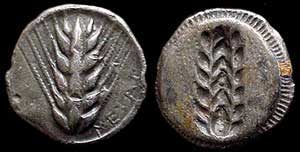Archaic Greece
== Archaic Greece ==
Archaic Greece refers to the period in Greek history from approximately 800 BC to 480 BC. This era followed the Greek Dark Ages and preceded the Classical period. It was a time of significant political, economic, and cultural development that laid the foundations for the subsequent achievements of Ancient Greece.
Political Developments[edit | edit source]
During the Archaic period, the polis (city-state) became the central political unit in Greece. Notable city-states such as Athens, Sparta, Corinth, and Thebes emerged during this time. The period saw the establishment of various forms of government, including oligarchy, tyranny, and early forms of democracy.
Economic Growth[edit | edit source]
The Archaic period was marked by substantial economic growth. The introduction of coinage around 600 BC facilitated trade and commerce. Greek colonies were established throughout the Mediterranean and Black Sea regions, which helped to spread Greek culture and increase wealth.
Cultural Achievements[edit | edit source]
The Archaic period witnessed significant advancements in art, literature, and philosophy. The development of the Greek alphabet allowed for the recording of Homer's epic poems, the Iliad and the Odyssey. In sculpture, the period is known for the creation of the kouros and kore statues, which displayed a more naturalistic style compared to earlier works.
Military Innovations[edit | edit source]
The period also saw the development of the hoplite soldier and the phalanx formation, which became the dominant military strategy in Greece. These innovations contributed to the success of Greek city-states in various conflicts, including the Greco-Persian Wars.
Religion and Mythology[edit | edit source]
Religion played a central role in Archaic Greece, with the worship of the Olympian gods and the establishment of major sanctuaries such as Delphi and Olympia. Greek mythology, which included tales of gods, heroes, and mythical creatures, was an integral part of Greek culture and influenced later literary and artistic works.
Related Pages[edit | edit source]
- Greek Dark Ages
- Classical Greece
- Ancient Greece
- Polis
- Homer
- Greek alphabet
- Hoplite
- Phalanx
- Olympian gods
- Delphi
- Olympia
Categories[edit | edit source]
This article is a ancient Greece–related stub. You can help WikiMD by expanding it!
Search WikiMD
Ad.Tired of being Overweight? Try W8MD's physician weight loss program.
Semaglutide (Ozempic / Wegovy and Tirzepatide (Mounjaro / Zepbound) available.
Advertise on WikiMD
|
WikiMD's Wellness Encyclopedia |
| Let Food Be Thy Medicine Medicine Thy Food - Hippocrates |
Translate this page: - East Asian
中文,
日本,
한국어,
South Asian
हिन्दी,
தமிழ்,
తెలుగు,
Urdu,
ಕನ್ನಡ,
Southeast Asian
Indonesian,
Vietnamese,
Thai,
မြန်မာဘာသာ,
বাংলা
European
español,
Deutsch,
français,
Greek,
português do Brasil,
polski,
română,
русский,
Nederlands,
norsk,
svenska,
suomi,
Italian
Middle Eastern & African
عربى,
Turkish,
Persian,
Hebrew,
Afrikaans,
isiZulu,
Kiswahili,
Other
Bulgarian,
Hungarian,
Czech,
Swedish,
മലയാളം,
मराठी,
ਪੰਜਾਬੀ,
ગુજરાતી,
Portuguese,
Ukrainian
Medical Disclaimer: WikiMD is not a substitute for professional medical advice. The information on WikiMD is provided as an information resource only, may be incorrect, outdated or misleading, and is not to be used or relied on for any diagnostic or treatment purposes. Please consult your health care provider before making any healthcare decisions or for guidance about a specific medical condition. WikiMD expressly disclaims responsibility, and shall have no liability, for any damages, loss, injury, or liability whatsoever suffered as a result of your reliance on the information contained in this site. By visiting this site you agree to the foregoing terms and conditions, which may from time to time be changed or supplemented by WikiMD. If you do not agree to the foregoing terms and conditions, you should not enter or use this site. See full disclaimer.
Credits:Most images are courtesy of Wikimedia commons, and templates, categories Wikipedia, licensed under CC BY SA or similar.
Contributors: Prab R. Tumpati, MD







